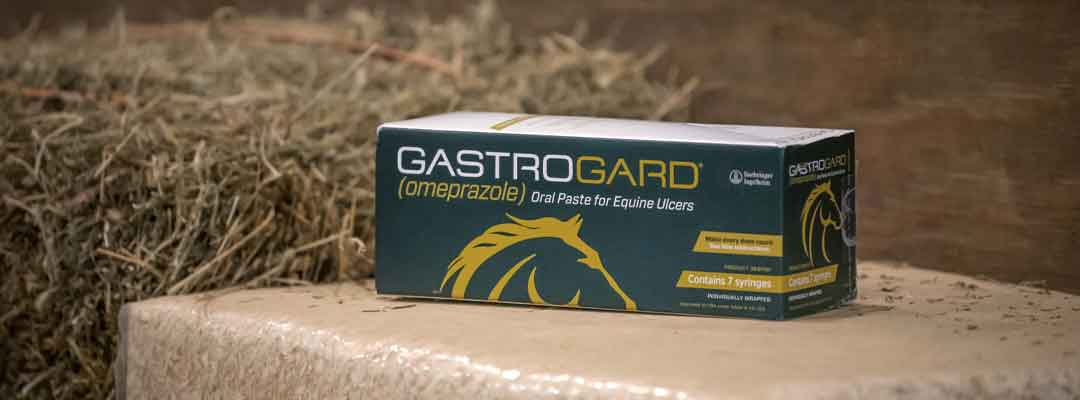Treating Equine Ulcers Using GastroGard
Treat ulcers in horses to ensure their happiness, health and performance

Ulcers are a risk for all horses; however, those we compete with and transport most frequently are among the highest risk. The American Association of Equine Practitioners states that ulcers impact 60% of show horses and 90% of racehorses. Horses of any age group can get ulcers. Luckily, though, there is a trusted treatment option available to help treat ulcers in horses to keep them performing their best.
Equine UlcersBefore diving into equine ulcer treatment, let’s first acknowledge how ulcers develop. Twenty-four hours a day, horses are continuously secreting acid in their stomach.
“Ulcers result from an erosion in the stomach lining,” said Tony Hawkins, DVM, Valley Vet Supply Technical Service Veterinarian. “The stomach has a protective lining over the surface of it, and stomach acid -- if it's not properly neutralized -- can erode holes and sores into the surface of the stomach. It can potentially turn very serious if untreated.”
It is best to keep horses out on pasture with ample forage -- or if stalled, ensure they receive plenty of hay to digest throughout the day. Feeding multiple meals a day can help as well. In doing so, ulcers are less likely to develop. But in addition to a horse’s diet, stressors are also the cause of equine ulcers. Physical stress from training, illness, pain and surgery -- and behavioral stress from transport, stall confinement, changes in routine, social regrouping and weaning all can result in ulcers.
Signs
Look for these common symptoms of ulcers in horses, and report them to your veterinarian right away. Signs can include a change in eating or drinking habits, weight loss, cribbing, wind sucking, dull hair coat, recurring colic, poor performance and overall poor attitude.
Diagnosis
“Ulcers are inherently difficult to diagnose,” Dr. Hawkins said. “The reason being is that a lot of the symptoms are subtle and easily overlooked. If you’re able to see your horse daily, keep close watch for any new behaviors your horse is demonstrating to best identify whether they could be related to stomach ulcers.”
Proper diagnosis is crucial for fast, effective treatment of ulcers in horses. A gastroscopic exam allows your veterinarian to examine the inside of the stomach and to definitively diagnose equine ulcers. If an ulcer is found, your horse may be prescribed treatment, and recommendations may be made for environmental and management changes that can help prevent ulcers in the future.
For Treatment of Equine Ulcers, Look to GastroGard
If your horse is experiencing any of the signs above, be sure to share the information with your veterinarian, and talk with them about GastroGard -- the only proven safe and effective equine gastric ulcer treatment approved by the FDA. “For treatment of equine ulcers, we can use GastroGard,” Dr. Hawkins said. “It has been extensively tested for its safety and effectiveness and works by reducing the production of acid in the horse’s stomach.”
With a long history of success in treating ulcers in horses, GastroGard paste has been shown to heal or significantly improve ulcers in 99% of treated horses. The active ingredient, omeprazole, works to suppress the secretion of gastric acid and gives the ulcer time to heal.
Benefits include:
In field trials involving 139 horses, including foals as young as one month of age, no adverse reactions attributable to GastroGard treatment were noted.
For treatment of equine ulcers using trusted GastroGard for horses, the contents of one syringe will dose a 1,250 lb. horse at the rate of 1.8 mg omeprazole/lb. of body weight (4 mg). For treatment of equine gastric ulcers, each weight-marking on the syringe plunger will deliver sufficient omeprazole to treat 250 lbs. of body weight. For prevention of recurrence of gastric ulcers, each weight-marking will deliver sufficient omeprazole to dose 500 lbs. of body weight.
Should your horse be impacted by ulcers, talk with your veterinarian about trusted treatment for their overall happiness, health and performance.
Learn about preventing ulcers in horses
This advertorial is sponsored by Boehringer Ingelheim.


